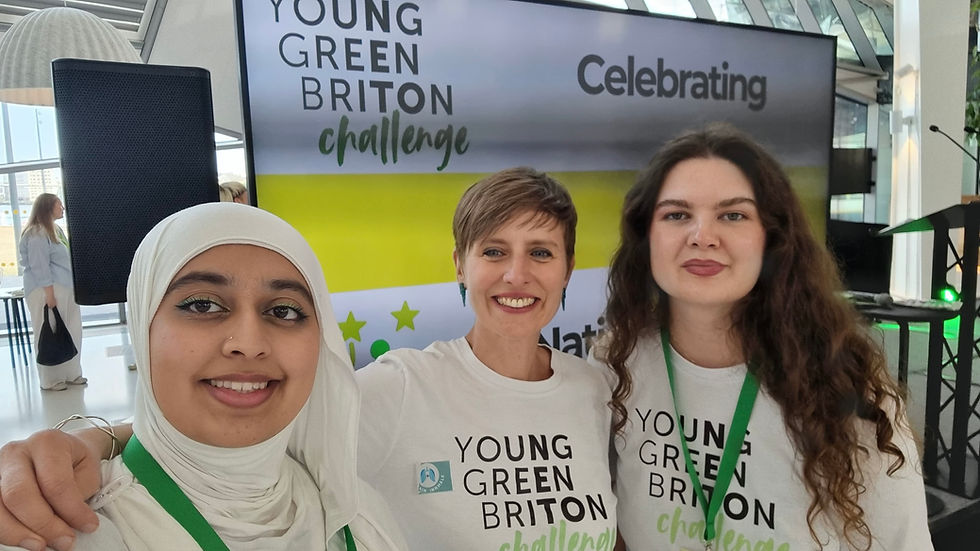SI4A Turns one!
- Katherine Crisp

- Jul 20, 2023
- 4 min read

It feels apt that Social Innovation for All celebrates its first birthday on the same day as many schools across England are finishing for the summer holidays.
After months of research I founded SI4A in July 2022 for two main reasons:
Talent is universal, but opportunities are not. According to Nesta’s ‘Opportunity Lost’ report only 1.5% of children get access to innovation and invention opportunities at school, disproportionately in private schools and London & the South East.
The curriculum in England fails to prepare children for the future. The Skillsbuilder partnership identifies the Essential Skills that boost employability, wellbeing and life satisfaction and highlights that access to skills development opportunities is also unequal.
So that’s the problem statement. What about the solution?
In a chapter in the forthcoming Ideas-Informed Society I outline the case for using social innovation in schools as a tool to build transferable skills and agency through local changemaking. So whilst I munch on a slice of birthday cake, I wanted to reflect on some of the things I have learnt over the last year (and the people who have helped me learn them):
The world needs a generation of green changemakers!
The initial focus for SI4A was simply youth-led changemaking. Through working together with the Ministry of Eco Education’s Paul Turner, Volunteer for Future's Laura Dempsey and visionary teachers such as Dr Meryl Batchelder, Dr John Patterson and Wendy Litherland I have realised the extent to which the English curriculum also fails to teach children about climate change. It should be cross-curricular, a part of every subject from 5 to 18. But it isn’t so green changemaking, combining climate change knowledge and skills for the future, has become a key area for SI4A through the Young Green Briton Challenge, the Primary Pioneers programme and Parklife.
Collaboration is key - you can go faster alone but further together
In the social change sector there is a lot of desire for collaboration and partnership working, but we aren’t always honest about the challenges of making it work in practice. The competition for funding is real. Aligned, yet somewhat differing, mission statements cause tensions. Partnership working creates (often unfunded!) overhead because it takes time to do well.
Partnership has been at the heart of the Young Green Briton Challenge, which has been co-created by the Ministry of Eco Education, Volunteers for Future and I Have a Voice with ongoing input from teachers and students. This has enabled us to build on the expertise of four organisations and people from very different professional backgrounds. The combination of knowledge about teaching, climate and conservation, campaigning and citizenship, design and innovation challenges and volunteer engagement has created a potent model that none of us could have developed on our own. However, it has required a heavy investment of time from all of us to establish ways of working and continue to coordinate across multiple organisations.
We have been supported on this journey by Dale Vince’s Green Britain Foundation. The Green Britain Partnership, convened by Helen Taylor together with Dahlia Nahome, is a powerful example of light touch, but very valuable, cross-sectoral convening around a common goal. A number of Green Britain Partners provided mentors for the Young Green Briton Challenge. And the environmentally friendly Forest Green Rovers football shirt was a great talking and engagement point within school workshops.
Learning by doing can be uncomfortable, but we all need to take ourselves out of our comfort zones
In my New Year’s Eve blog I reflected on some of the things I learnt during 2022. The last year has been a constant learning curve.
From web design to book-keeping.
From building Key Stage 2 & 3 curriculum materials to facilitating workshops with 280 Year 7s.
From running an event at the House of Lords to hosting a Q&A session with an MP in a primary school.
From writing a full set of policies and procedures to inducting our first employee - the wonderful Ameena Rahim through Brunel University’s sector learning Summer Internship Programme.

This has taken me outside of my comfort zone in so many different ways, but it has also been energising and fun to move fast, to learn and to work with so many different people. Caspian Woods, Julie Newing, Laura Dempsey and Rebecca Deegan all provided wise words and practical support in taking the first leap into the unknown and setting up SI4A. Laila Takeh’s network and insights were key to the journey. She also personified ‘learning by doing’ and ‘taking yourself out of your comfort zone’ by joining us in snowy Rochdale to facilitate one of the earliest Young Green Briton workshops with 260 Year 9s! The RSA network has provided funding (through a Catalyst Grant for Primary Pioneers), insight and connections through its fellows network and events programme.
Never lose focus on what you are trying to achieve
It’s easy to get subsumed into day to day busy-ness. Looking back on the first year for SI4A we have directly worked with over 3,000 young people to give them meaningful changemaking skills and opportunities. Over 2,700 of those have been through the Young Green Briton Challenge in state secondary schools - something many people told us at the outset would be too difficult to access.
“The best thing I have realised about this competition is the empowerment it gives the pupils. It may not seem like something big, but giving pupils the freedom to share their voice with different people, especially when they come from an area that they feel they do not have a voice, it truly is something that is life changing for them.” [Teacher, YGBC]

If you are interested in learning more about our work or would like to work together please get in touch or follow.





Comments